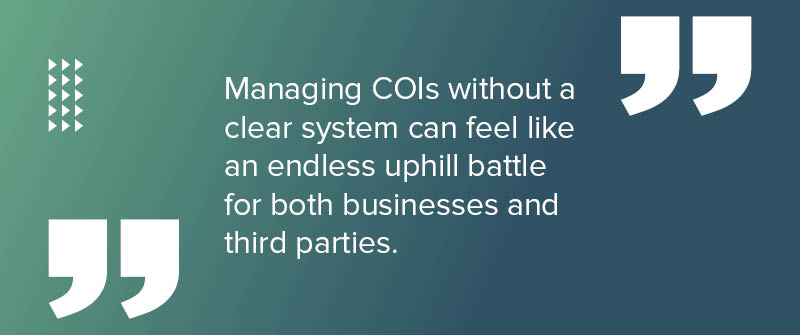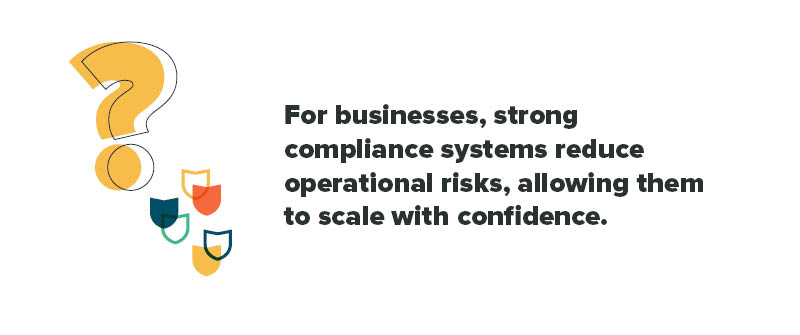
A strong compliance strategy is more than a checklist; it’s a powerful tool that empowers your business to operate securely, grow confidently, and build lasting partnerships. At the center of this strategy lies insurance compliance, ensuring that your company aligns with all necessary legal, regulatory, and contractual insurance obligations.
By making insurance compliance a priority, you’re not just managing risks––you’re laying the foundation for trust, accountability, and resilience. This is especially vital when working with third parties such as vendors, contractors, and service providers. Through thoughtful collaboration, compliance becomes more than an administrative task. It transforms into a shared opportunity to strengthen relationships, streamline operations, and achieve mutual success through proactive measures that prevent costly oversights.
When overlooked, poor COI management can lead to significant financial, operational, and emotional tolls for everyone involved. But when managed effectively, it protects all parties and sets the stage for long-term growth. This article explores the hidden costs of ineffective COI management and offers actionable strategies to turn compliance into your business’s advantage.
What Is Insurance Compliance?
At its core, insurance compliance ensures a business follows necessary legal, regulatory, and contractual insurance obligations. It’s the foundation for protecting operations, fostering accountability, and building resilient partnerships that stand the test of time.
Certificates of Insurance (COIs) are critical to this framework. These documents prove that third parties carry appropriate insurance to meet liability standards. For businesses, they signal that partners are adequately prepared, reducing risks. For third parties, they demonstrate professionalism and reliability while fulfilling contractual requirements.
When COI management is handled thoughtfully, it becomes more than a task––it’s a mechanism for building trust, aligning responsibilities, and cultivating relationships rooted in transparency.
The Hidden Costs of Poor COI Management
Ineffective COI management goes far beyond surface-level issues, as it introduces both tangible and unseen costs that affect businesses and their third-party partners. While financial losses, project delays, and reputational damage are immediate concerns, the operational and emotional toll can be just as significant. Poor compliance can also expose companies to additional risks that are harder to quantify but equally damaging.
1. Financial Penalties and Legal Liabilities
Without proper COI oversight, businesses risk hefty fines or penalties if third parties are found to be uninsured or underinsured during incidents like property damage or workplace injuries. Similarly, third parties can incur significant financial setbacks by neglecting to maintain the required insurance coverage.
2. Operational Inefficiency and Frustration
Managing COIs without a clear system can feel like an endless uphill battle for both businesses and third parties. Some unseen operational challenges include:
- Exhaustion from chasing documents, emails, and calls daily: Businesses often spend hours tracking down missing COIs or awaiting clarification on insurance details.
- Difficulty staying organized: Managing renewals, compliance updates, and tracking status manually is tedious and prone to errors.
- Frustration with agents and non-compliance resistance: Resistance from agents or vendors when resolving compliance issues creates inefficiencies and stress.

3. Uncertainty and Risk Exposure
Both parties may struggle with confusion due to the complexity of insurance, leading to challenges such as:
- Decoding insurance jargon and requirements: COI details often feel overwhelming for non-experts.
- Uncertainty about compliance decisions: This leads to inconsistent judgments or missing renewal deadlines, increasing liability.
4. Burnout and Internal Stress
The stress from ineffective COI management impacts both productivity and morale:
- Feeling overwhelmed by excessive tasks and follow-ups: Repeated manual processes result in task fatigue.
- Worry about compliance visibility and decision-making: Gaps in transparency breed a sense of insecurity over potential risks or liabilities.
- Fear of costly mistakes: Businesses and third parties both risk losses if compliance failures lead to legal action or damaged relationships.
5. Administrative and Security Risks
Manual COI tracking via spreadsheets or emails increases the risk of data breaches, lost records, or miscommunication. Without audit trails and version control, businesses may be unable to prove compliance during legal reviews.
Broken Trust and Contractual Fallout
Vendors may be dropped or penalized for non-compliance. Contract disputes may arise due to unclear or outdated COI documentation, leading to strained partnerships, delays, or even litigation.

How Businesses and Third Parties Benefit from Effective COI Management
The management of COIs has far-reaching benefits for both businesses and the third parties they work with:
1. Strengthen Accountability
For businesses, reviewing COIs ensures contractors and service providers meet necessary insurance requirements, reducing liability risks.
For third parties, presenting accurate COIs demonstrates preparedness and adherence to professional standards. This mutual accountability fosters trust and strengthens relationships over time, making COI compliance a wise investment in long-term success.
2. Minimize Risks for Everyone
When third parties provide proper COIs, they mitigate liabilities for both themselves and the businesses they serve. Verified COIs ensure coverage in case of accidents or damages, safeguarding both sides.
For instance, a business hiring a vendor with comprehensive general liability insurance can confidently avoid unexpected property damage penalties, with the vendor affirming their commitment to responsibility.
3. Build Transparency in Partnerships
Clear COI management encourages open communication and transparency. Transparent processes reassure businesses about risk management and give third parties confidence in meeting obligations.
This alignment lays the groundwork for genuine collaboration, with both parties working toward shared goals.
4. Open Doors to New Opportunities
For businesses, strong compliance systems reduce operational risks, allowing them to scale with confidence. For third parties, sustaining compliance helps increase their credibility and marketplace competitiveness within the broader industry.
Steps to Build Collaborative COI Management
Whether you’re a business or a third party, COI management shouldn’t be seen as an administrative hassle but as a chance to improve processes and bolster partnerships. Here’s how each group can contribute:
For Businesses
- Set Clear Expectations Early
Communicate your insurance requirements upfront. Include coverage types (general liability, workers’ compensation), policy limits, and renewal timelines in contracts. Defining terms early reduces future issues. - Leverage Technology for Smarter Compliance
Technology plays a vital role in simplifying compliance, it allows teams to focus on growth and relationship-building. Businesses can use advanced tools to:- Send automated renewal reminders to ensure compliance remains up to date.
- Surface actionable risk insights based on compliance data to address gaps effectively.
- Create dashboards for at-a-glance visibility into compliance statuses and key deadlines.
- These tools reduce manual workloads, improve efficiency, and empower decision-making.
- Recognize Third-Party Efforts
Appreciate prompt communication and compliance proof. Acknowledging a vendor’s timely COI submission fosters goodwill and strengthens your working relationships. - Audit Compliance Proactively
Regular reviews of compliance systems prevent potential risks or missed renewals. Stay proactive by identifying gaps early.
For Third Parties
- Understand the Importance of COIs
See compliance as a professional opportunity. Providing up-to-date COIs affirms your commitment to operational excellence. - Leverage Technology to Simplify Compliance
Adopt tools to make compliance less demanding. Technology can assist with:- Uploading documentation securely for better organization.
- Tracking renewal schedules and automating updates to prevent avoidable delays.
- Providing insurance insights tailored to non-experts, empowering you to act confidently without waiting for feedback.
- Communicate Clearly and Frequently
When clarifications are needed on requirements, reach out early. This reduces delays and shows your commitment to strong collaborations. Strong internal communication between teams also plays a crucial role in preventing missed deadlines or misunderstandings. - Submit COIs Without Delay
Consistent and timely COI submissions demonstrate professionalism. Avoid complications or delays by proactively meeting deadlines.
Collaboration Creates Opportunities
When businesses and third parties take responsibility for COI management together, they create a foundation of trust, accountability, and growth. Effective management reduces stress, clarifies responsibilities, and ensures coverage.
With stronger compliance, businesses benefit from seamless operations and reduced risk, while third parties build credibility and unlock new opportunities. Together, you strengthen partnerships and create a roadmap toward success.
By making compliance an asset, both parties can look forward to efficient, transparent, and secure business collaborations. Book a demo today!